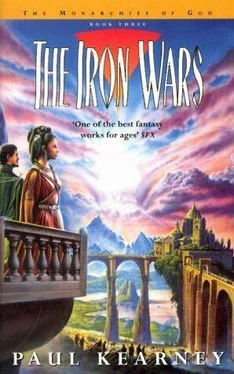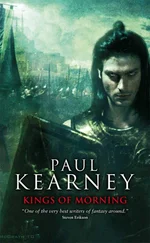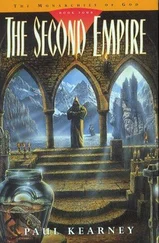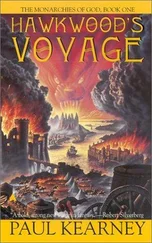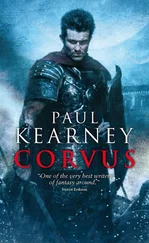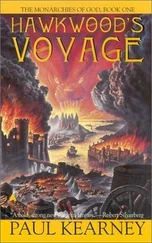Paul Kearney - The Iron Wars
Здесь есть возможность читать онлайн «Paul Kearney - The Iron Wars» весь текст электронной книги совершенно бесплатно (целиком полную версию без сокращений). В некоторых случаях можно слушать аудио, скачать через торрент в формате fb2 и присутствует краткое содержание. Жанр: Фэнтези, на английском языке. Описание произведения, (предисловие) а так же отзывы посетителей доступны на портале библиотеки ЛибКат.
- Название:The Iron Wars
- Автор:
- Жанр:
- Год:неизвестен
- ISBN:нет данных
- Рейтинг книги:4 / 5. Голосов: 1
-
Избранное:Добавить в избранное
- Отзывы:
-
Ваша оценка:
- 80
- 1
- 2
- 3
- 4
- 5
The Iron Wars: краткое содержание, описание и аннотация
Предлагаем к чтению аннотацию, описание, краткое содержание или предисловие (зависит от того, что написал сам автор книги «The Iron Wars»). Если вы не нашли необходимую информацию о книге — напишите в комментариях, мы постараемся отыскать её.
The Iron Wars — читать онлайн бесплатно полную книгу (весь текст) целиком
Ниже представлен текст книги, разбитый по страницам. Система сохранения места последней прочитанной страницы, позволяет с удобством читать онлайн бесплатно книгу «The Iron Wars», без необходимости каждый раз заново искать на чём Вы остановились. Поставьте закладку, и сможете в любой момент перейти на страницу, на которой закончили чтение.
Интервал:
Закладка:
His men were encamped in the pastures of one of the late Duke Ordinac’s stud farms. Three acres of leather tents-also the property of the late duke-had been pitched in scattered clumps by the four hundred tribesmen who remained under Corfe’s command. The makeshift camp was as busy as a broken ants’ nest, with men and horses, the smoke of cookfires, the clinking of hammers on little field-anvils, the vastly intricate and familiar and to Corfe wholly invigorating stink and clamour of a cavalry bivouac.
The gelding danced under him as it seemed to catch the lift of his spirits and he calmed it with voice and knees. He had mounted pickets half a mile out in every direction, and Andruw was two days gone with twenty men on a reconnaissance towards Staed, where Duke Narfintyr was arming against the King with over three thousand men under his banner already.
Stiff odds. But they would be farmers’ sons and lesser nobles, peasants turned into soldiers for the day. They would not be the born warriors that Corfe’s savage tribesmen were. And there were very few infantry troops on earth who could stand up to a heavy cavalry charge, if it were well handled. Professional pikemen perhaps, and that was all.
No, Corfe’s worst enemy was time. It was trickling through his fingers like sand and he had none to spare if he were to find and defeat Narfintyr before being superseded by the second army that King Lofantyr had sent south.
Today was the third of the five Saint’s Days that scholars had tacked on to the last month of the year to keep the calendar in step with the seasons. In two days’ time it would be Sidhaon , the night of Yearsend, and then the cycle would begin anew, and the season start its slow turn towards the warmth and reawakening of spring.
It seemed long overdue. This had been the longest winter of Corfe’s life. He could hardly remember what it was like to feel warm sun on his face, to walk on grass instead of trudging through snow or quagmire. A hellish and unnatural time of the year to be making war, especially with horse-soldiers. But then the world had become a hellish and unnatural place of late, with all of the old certainties overturned.
He considered this second army on its way south to deal with the rebels it was his own mission to destroy. A certain Colonel Aras, one of the King’s favourites, had been given a tidy little combined force with which to subdue the southern nobles, as the King had clearly expected Corfe to make a hash of it with his barbaric, ill-equipped command. He had enemies behind as well as in front, more to worry about than tactics and logistics; he had to be something of a politician as well. These things were inevitable as one rose higher in rank, but Corfe had never expected the intricacies and balances to be so murderous. Not in a time of war. Half the officers in Torunn, it had seemed to him, were more intent on winning the King’s favour than on throwing the Merduks back from Ormann Dyke. When he thought about it, a black, beating rage seemed to hover over him, an anger which had had its birth in the fall of Aekir, and which had been growing silently and steadily in him ever since without hope of release. Only wanton murder could hope to ease it. The killing of Merduk after Merduk down to the last squalling dark-skinned baby until there were no more of them left to stink out the world. Then perhaps his dreams would cease, and Heria’s ghost would sleep at last.
A courier cantered up to him and, without flourish or salute, said: “ Ondrow come back.”
He nodded at the man-his tribesmen were picking up quite a bit of Normannic, but still had little notion of the proper forms of address-and followed him as he cantered easily up the hill that dominated the bivouac. Marsch was there, and Ensign Ebro, with three pickets. Ebro slapped out a salute which Corfe returned absently.
“Where away?”
“Less than a league, on the northern road,” Marsch told him. He was rubbing his forehead where the heavy Ferinai helm had begun to chafe it. “He’s in a hurry, I think. He pushes his horses.” Marsch sounded faintly disapproving, as if no emergency were important enough to warrant the maltreatment of horses.
“He’s swung round then,” Corfe said approvingly. “I’ll bet he’s been taking a look at our rivals in the game.”
They sat there watching the score of horsemen galloping up the muddy northern road with the clods dotting the air behind them like startled birds. In ten minutes the party had reined in, the horses’ nostrils flared and red, their necks white with foam. Mud everywhere, the riders’ faces splattered with it.
“What’s the news, Andruw?” Corfe asked calmly, though his heart had begun to thump faster.
His adjutant tore off his helm, his face a mask of filth.
“Narfintyr sits in Staed like an old woman at the hearth. Farmers’ boys, his men are, with a few nobles in fifty-year-old armour. None of the other nobles have risen-they’re waiting to see if he can get away with it. They’ve heard of Ordinac’s fate, but no one thinks we are regular Torunnan troops. The gossip has it that Ordinac ran into a war-party of Merduk deserters and scavengers.”
Corfe laughed. “Fair enough. Now, what news from the north?”
“Ah, there’s the interesting part. Aras and his column are close-less than a day’s march behind us. Nigh on three thousand men, five hundred of them mounted-cuirassiers and pistoleers. And six light guns. They have a screen of cavalry out to their front.”
“Did they see you?” Corfe demanded.
“Not a chance. We crawled on our bellies and watched them from a ridgeline. They’re bound by the speed of the guns and the baggage wagons, and the road is a morass. I’ll bet they’ve cursed those culverins all the way south from Torunn.”
Corfe grinned. “You’re beginning to talk like a cavalryman, Andruw.”
“Aye, well, it’s one thing firing them, quite another coaxing them through a swamp. What’s to do, Corfe?”
They were all looking at him. Suddenly there was a different feeling in the air, a tenseness which Corfe knew and had come to love.
“We pack and move out at once,” he said crisply. “Marsch, see to it. I want one squadron out in front as a screen. You will command it. Another to herd the remounts, and a third as rearguard under Andruw here. The lead squadron moves out as soon as they can saddle up. The rest will follow when they can. Gentlemen, I believe we have work to do.”
The little knot of riders split up, Andruw’s party heading for the horse herd to procure fresh mounts. Only Ebro remained beside Corfe.
“And what am I to do, sir?” he asked, half resentful and half plaintive.
“Get the baggage mules sorted. I want them ready to move out within two hours. Pack everything you can, but don’t overload them. We have to move quickly.”
“Sir, Narfintyr has three thousand men; we are less than four hundred. Hadn’t we better wait for Aras to come, and combine with him?”
Corfe stared coldly at his subordinate. “Have you no hankering for glory, Ensign? You have your orders.”
“Yes, sir.”
Ebro galloped off, looking thoroughly discontented.
The perfect industry of the bivouac was shattered as the officers rode around shouting orders and the tribesmen hurried to don their armour and saddle their horses. Marsch had found a store of lances in the late Duke Ordinac’s castle and the troopers ran to collect theirs from the forest of racks that sprouted between the tents. The tents themselves were left behind, as they were too heavy to be carried by the pack mules that comprised Corfe’s baggage train. The stubborn, braying beasts had enough to bear: grain for a thousand horses for a week, the field-forges with their small anvils and clanking tools. Pig-iron for spare horseshoes, and extra lances, weapons and armour, to say nothing of the plain but bulky rations that the men themselves would consume on the march. Twice-baked bread, hard as wood, and salt pork for the most part, as well as cauldrons for each squadron in which the pork would be steeped and boiled. A million and one things for an army which was hardly big enough to be an army at all. Ordinarily, a field force would have one heavy double-axled ox-drawn wagon for every fifty men, twice that for cavalry and artillery. Corfe’s two-hundred-strong mule train, though it looked impressive en masse, could barely carry anything by regular military standards.
Читать дальшеИнтервал:
Закладка:
Похожие книги на «The Iron Wars»
Представляем Вашему вниманию похожие книги на «The Iron Wars» списком для выбора. Мы отобрали схожую по названию и смыслу литературу в надежде предоставить читателям больше вариантов отыскать новые, интересные, ещё непрочитанные произведения.
Обсуждение, отзывы о книге «The Iron Wars» и просто собственные мнения читателей. Оставьте ваши комментарии, напишите, что Вы думаете о произведении, его смысле или главных героях. Укажите что конкретно понравилось, а что нет, и почему Вы так считаете.
